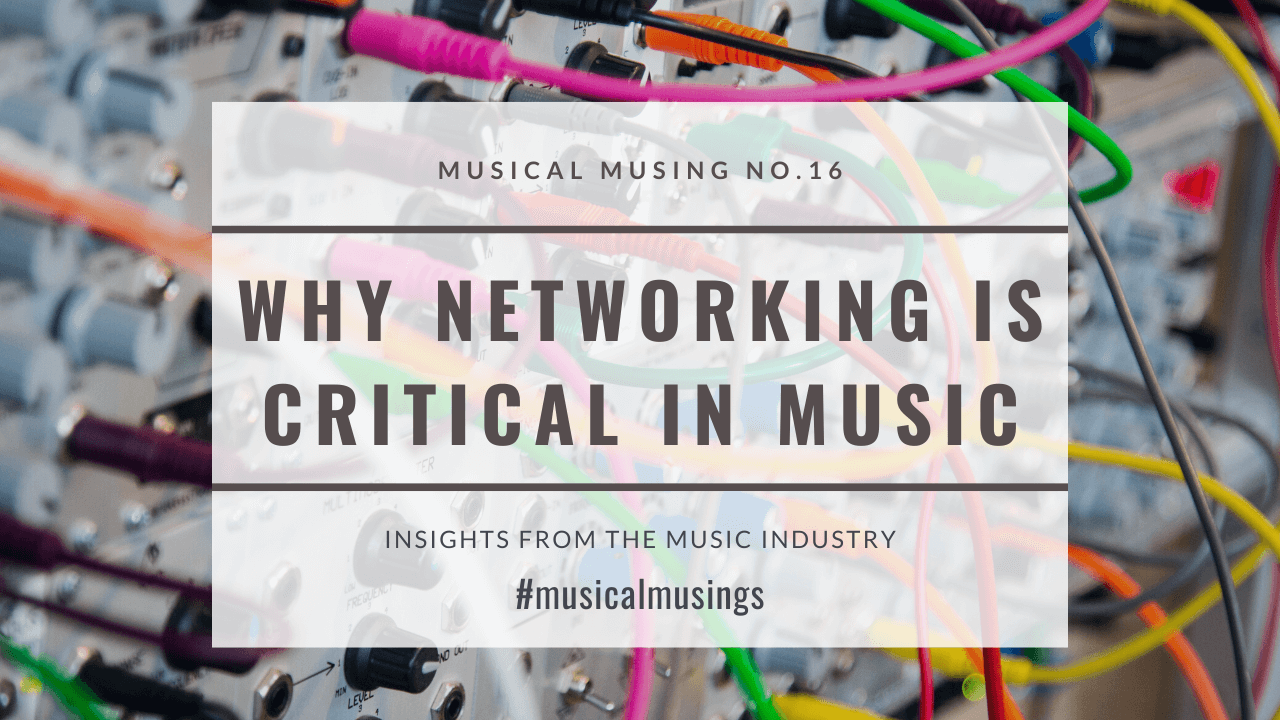Why Networking is Critical in Music
I horrifically embarrassed myself at the Edinburgh Television Conference. I sidled over to someone I recognised, outlined where I was from, what university I went to, what companies I’d worked for but still couldn’t work out how I knew him. It turns out I didn’t know him at all, but merely recognised him from the TV series ‘The Inbetweeners’

Networking can be daunting and awkward.
I don’t like the term “networking.” It feels corporate and predatory. I’ve coined the phrase ‘Community Building.’ It feels more inclusive and collaborative and the prospect of building a community feels more positive.
It’s this access to a community of like minded professionals that facilitates:
- Exchanging ideas
- Creating Opportunities
- Learning from peers
- Visibility within your field
- Understanding of Industry norms and trends
Those are just a few reasons why networking is critical in music although the same can be said of any industry. People want to work with others that they know and like. So you want to get to know as many people as possible… and hopefully some of them will like you.
So whether you are an artist or band, composer, music producer or mix engineer networking is critical. You can be the best at your craft but if you can’t get any work, it will always be a hobby.
Networking Success
In the past I’ve made the mistake of judging the “success” of a networking event by how many business cards I come away with and then subsequently how much work I get from them in the following week. Invariably it’s none. It doesn’t work like that.
 I now see it as developing a community of like minded individuals with shared interests and values with whom I enjoy spending time. Not only does this reframe the experience in a more positive light but it presents it as something which takes time to develop.
I now see it as developing a community of like minded individuals with shared interests and values with whom I enjoy spending time. Not only does this reframe the experience in a more positive light but it presents it as something which takes time to develop.
Think of it like dating. You could go on five dates and only meet one person that you really hit it off with. You’d then organise subsequent dates to get to know that person better.
The same is true with community building. At any given event you could meet one person that you really connect with. You then need to maintain that contact in order to develop a relationship.
How do you build and maintain relationships?
Therein lies one of the principal difficulties. How do you maintain a relationship with some you’ve met once?
Well the short answer is by going back to repeat events where you’ll see that person again. Or by setting up your own event and inviting that person along.
But continued interaction is essential to develop a relationship. Otherwise it’s just a random encounter.
Customer Relationship Management
It’s probably worth introducing the concept of Customer Relationship Management (CRM). CRM is basically developing new and maintaining existing customer relationships.
To assume that because you’ve worked for someone once, it’s a done deal is a mistake. Maintaining a relationship with previous clients is critical to ensuring repeat work but also that you stay top of mind should any appropriate projects come along
It Takes Time
This brings me on to the idea that growing a community takes time and concerted effort.
In the past, when I’ve been busy, I haven’t made time to network or even maintain existing relationships.
To think I can network every few years when I have a lull in my workload is a big mistake. Even when I’m busy I need to be doing it. Especially when I’m busy, as I actually have projects to talk about.
This area of your professional activity is about working ON your business rather than FOR your business.
This subject is a post in itself but as a composer working for your business is composing or producing. Working on your business is taking the actions necessary to enable you to continue working for your business. e.g. marketing, networking, advertising, accounts etc.
5 Networking Tips
- Get there early – It’s quieter, groups haven’t formed yet and so is less daunting
- Take Responsibility for Following Up – You should definitely take your own cards and hand them out strategically (don’t spam people.), but I always ask for other people’s business cards. That way I can take responsibility for following up
- It’s an enquiry not a sales pitch – Nobody wants to hear a sales pitch. Instead show genuine interest in people and what they do. In turn they will do the same for you
- Be Passionate – It can be difficult to talk about yourself and what you do without feeling self conscious or arrogant but no one will ever judge you for being passionate about what you do
- Don’t be Cliquey – Once you have a group of people that you like talking to it can be tempting to just stay with them, but don’t be afraid to excuse yourself to talk to other people. You can always slot right back in afterwards
If you’ve found this useful here’s some others that you might find useful:
Why Building a Brand in Music is so Important
6 Key Elements to Becoming a Music Professional
The Six Figure Home Studio has a good podcast series about working on your business rather than for your business:
How You Can Work ON Your Business Instead of IN Your Business (Part 1)


